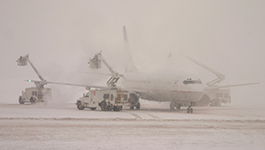Fuel System Icing Inhibitors
Preventing the formation of ice in aviation fuels
At high altitude and/or low temperatures, free water in aviation fuels can crystallize and block fuel filters. Despite the stringent measures which have been put in place to eliminate water from aviation fuels, the possibility of free water contamination still exists.
In civilian aircraft, fuel heaters can help to minimize the formation of ice in fuels. However, military aircraft do not generally use these heaters, due to restrictive weight requirements.
Fuel System Icing Inhibitor (FSII) acts to prevent the formation of ice crystals, providing additional security in the event of free water contamination in aviation fuel. It is a mandatory additive in many military aviation fuel specifications.
FSII dissolves sparingly in fuel, but more easily in water. Any water present will extract FSII from the fuel; the additive then acts to reduce the freeze point of the free water, preventing the formation of solid ice crystals which could block the fuel supply system.
Innospec’s FSII-41 ice inhibitor is based on Di-Ethylene Glycol Monomethyl Ether (DiEGME) chemistry, the preferred solution for today’s market.
The additive is suitable for use in either aviation turbine fuel (jet fuel) or aviation gasoline, subject to specification requirements and approvals.
| FSII specifications | |
| ASTM D4171 (Type III) | DEF STAN 68-252 |
| MIL-DTL-85470B | |
| Aviation turbine fuel | |
| ASTM D1655 | MIL-DTL-5624 |
| MIL-DTL-83133 | DEF STAN 91-91 |
| DEF STAN 91-86 | DEF STAN 91-87 |
| DEF STAN 91-88 | |
| Civil aviation gasoline | |
| ASTM D910 | |
FSII-41 meets the specification requirements for:
The typical treat rate for FSII-41 is 0.10% to 0.15%.



